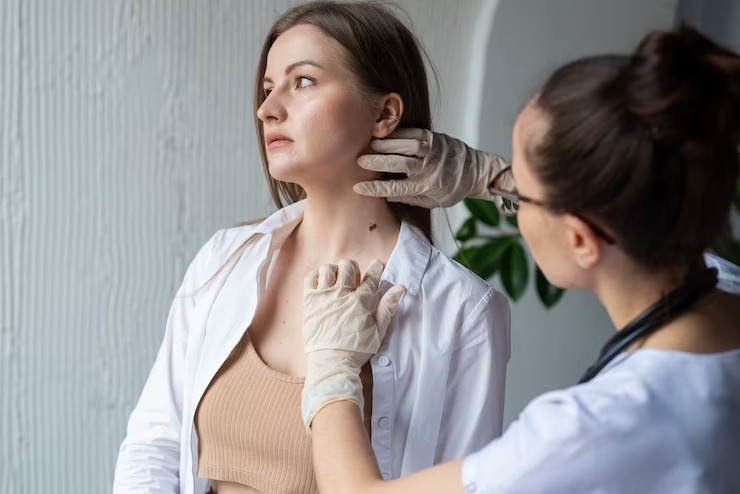Preventive Healthcare
Skin Cancer in People of Color: Understanding Unique Risks and Challenges
1231 Views
0

Skin tone is a confluence of underlying racial genetics influenced by climatic conditions. This World Skin Cancer Awareness Month (from 4 May 2023), learn more about the underlying factors that make people of colour vulnerable to this condition. Read this blog for clinical and lifestyle factors that can help you detect skin cancer at a nascent stage.
Skin Cancer in People of Colour: Overview
People of colour include individuals located worldwide, except the Caucasian race. It comprises Asia, Africa, parts of Oceania, Europe, and North and South America. The likelihood of skin cancer is high amongst people of colour, given the intense sun exposure throughout their lifetime.
However, the presence of underlying carcinoma genes, poor lifestyle, and occupational hazards can also raise the chances of skin melanoma. While there are nearly 64 skin colour allelic combinations, those with olive, brown, black, and yellow skin tones can develop cancerous complications from intense sunburn.
Are People of Colour Prone to Developing Skin Cancer?
Skin cancer may occur in locations that may or may not be exposed to intense sunlight. While prolonged UV exposure does lead to mutations in underlying skin protein and DNA, the nature of cancer depends on personal history.
Most skin cancer conditions detected in people of colour are non-melanoma. These include squamous cell carcinoma and may spread around the body unique to racial populations. These conditions may manifest as a harmless mole or wart and proliferate when left untreated.
What are The Potential Skin Cancer Symptoms?
Skin cancer symptoms are mostly silent. The condition often shows no marked signs until it reaches the stage of carcinoma and melanoma. Remember, consult your doctor if you experience abnormal skin development that doesn't disappear or repeat. It includes:
- An abrupt change in skin colour and texture that's limited to spots.
- Unexplained skin bumps that may appear waxy or red.
- A recurring bruising of the skin leads to open wounds and frequent healing.
- Skinwarts appear rough with marked scales and crusty raised borders.
- The appearance of patchy and painful lesions on the epidermis.
- Dark moles on the skin that change colour or cause pain and occasional bleeding.
- Unexplained pigmentation around your hands and feet (check for dark lines around your nails).
How to Diagnose Skin Cancer Symptoms in People of Colour?
Most skin cancer patients have a history of poor skin care, intense sun exposure, or underlying clinical records of cancer in the family. If you experience unexplained skin issues that don't heal naturally, consult your physician to get checked for suspected cancerous presence. Here's more about diagnosing potential carcinoma signs:
- A registered medical practitioner manually observes the suspected epidermal condition.
- For further diagnosis, your doctor might recommend a skin biopsy, which includes collecting the suspected skin samples for carcinoma or melanoma detection.
- Unlike other cancer forms, blood tests and imaging techniques don't provide information in detecting this cancerous condition.
What are The Available Treatments to Alleviate Skin Cancer Progression?
Skin cancer is a treatable condition, meaning prompt diagnosis and early detection can prevent it from metastasis or further advancement. The treatment choice depends on the extent of the cancerous presence. Here's more about potential treatment options:
- Apply liquid nitrogen to the suspected skin surface, which can freeze the underlying cancerous cell mass. Next, it falls off as a dried mass naturally.
- Surgical removal of skin mass using excision and scrapping to ensure complete sanitisation of suspected cancerous presence
- Radiation therapy irradiates the site of infection with powerful energy beams to destroy the suspected cell mass. Chemotherapy is also a similar option depending on the site of skin carcinoma.
- Biological immunotherapy or nutritional therapy is an innovative method to starve the suspected cancer cell without using invasive techniques.
Is skin cancer preventable?
Skin cancer is among the most prevalent conditions, with nearly 90% of the cases being basal carcinoma. However, it's preventable with an early diagnosis. Here are preventive measures that can help you stay away from potential triggers of skin carcinoma:
- Stay away from intense sun exposure for long periods.
- Use sunscreen and moisturiser to keep your skin protected when stepping out.
- Prevent frequent tanning sessions as it damages the underlying melanin tissue through intense UV exposure.
- Pay attention to your skin and contact your physician if your skin abrasions don't heal properly.
What are The Prevalent Risk Factors for Developing Skin Cancer?
Individuals with suspected melanoma genes like CDKN2A in their family are prone to developing skin cancer. Again, poor skincare routines and reckless lifestyles can also add to carcinoma. Here's more about the potential factors that make you vulnerable:
- Chain smokers are more prone to skin melanoma
- Individuals participating in intense tanning sessions are more at risk of carcinoma
- Occupational commitments that demand long hours under the sun
- Previous history of existing cancerous conditions
- Untreated skin problems
- Individuals with hypersensitive immunity or auto-immune disorders are prone to melanoma.
- Individuals with severe skin issues like atopic dermatitis have an extensive risk of developing cancerous conditions.
Conclusion
Skin cancer often has the highest survival rate when detected early. Besides, advanced diagnostic techniques and seamless treatments make it possible to tackle further advancement. Remember, never ignore your body when experiencing abnormal skin issues. Lead a healthy lifestyle and check your body regularly if you have a history of cancer.
The quickest way to defeat skin cancer is a prompt diagnosis. Your doctor may suggest a specialised biopsy test for carcinoma confirmation. Do you need an at-home sample collection? Metropolis Lab provides best-in-class features with trained technicians collecting your samples. For more information about cancer marker profiles, visit their website today.













1701259759.webp)









 WhatsApp
WhatsApp